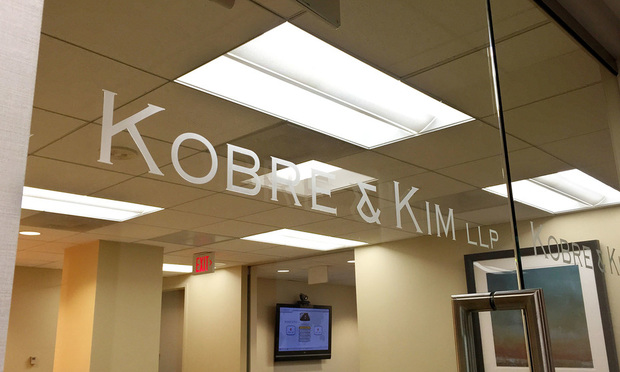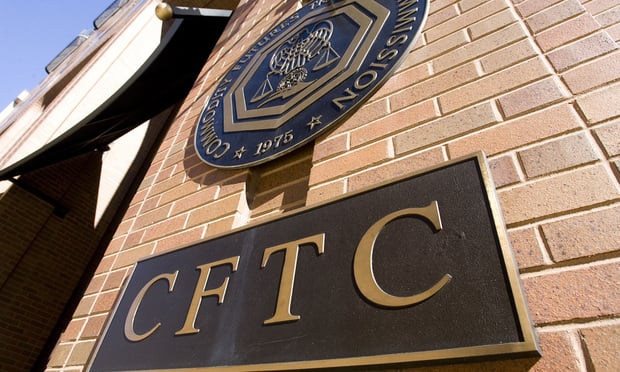Law Firm Sues US Regulatory Agency for Records About Settlement's Gag Order
"In effect, the CFTC negotiated a private resolution that left the industry without any intelligible guidance," the law firm Kobre & Kim said in a public-records lawsuit filed Thursday in Manhattan federal district court.
November 01, 2019 at 10:27 AM
5 minute read
 Kobre & Kim offices in Washington, D.C. (Photo: Diego M. Radzinschi / ALM)
Kobre & Kim offices in Washington, D.C. (Photo: Diego M. Radzinschi / ALM)
A new federal public records lawsuit in Manhattan seeks to force a U.S. regulatory agency to open up about why it agreed to a rare gag provision that limited public statements about a closely watched $16 million settlement with major food producers.
The law firm Kobre & Kim filed the Freedom of Information Act suit Thursday in U.S. District Court for the Southern District of New York against the U.S. Commodity Futures Trading Commission.
CFTC leaders in Washington had apparent concerns about agreeing to a provision that would limit what the agency could say publicly about the settlement with Kraft Foods Group Inc. and Mondelēz Global. A Chicago judge recently voided the settlement amid complaints—from defense lawyers for the companies—that the CFTC's press statements violated the secrecy provision.
The agency has since removed three press statements from a government website, as the judge now considers whether to hold the agency—but not individual commissioners—in civil contempt. Lawyers for the agency have denied making any improper statements.
Kobre & Kim's public-records suit squarely focuses on the settlement's gag requirement, and it raises questions about how any continued secrecy could "threaten to chill legitimate market behavior while failing to deter potential misconduct in the future." The suit noted how much attention regulatory and compliance lawyers had been paying to the Kraft litigation.
"In effect, the CFTC negotiated a private resolution that left the industry without any intelligible guidance and with a potential misimpression that the legal theories asserted against Kraft had a sound legal basis," Kobre & Kim lawyers, including Benjamin Sauter in New York, said in their complaint.
The New York-based law firm said it expects that documents "will shed light on a question of great public interest: why did the CFTC, the nation's principal regulator of commodities and derivatives markets, try to conceal the factual and legal bases for its litigation settlement with Kraft Foods Group Inc. and Mondelēz Global LLC and agree never to discuss that settlement in public?"
At the time of the mid-August settlement, the CFTC said the gag provision limited only what the agency could say about the litigation, but not individual commissioners.
"We do not expect the commission to agree to similar language in the future, except in limited situations where our statutory enforcement mission of preventing market manipulation is substantially advanced by the settlement terms and the public's right to know about commission actions is not impaired," the agency said in August in a press statement.
 U.S. Commodity Futures Trading Commission. (Photo: Diego M. Radzinschi / ALM)
U.S. Commodity Futures Trading Commission. (Photo: Diego M. Radzinschi / ALM)Two Democratic CFTC commissioners—Dan Berkovitz and Rostin Behnam—went further, issuing a separate statement that questioned the soundness of the agency agreeing to a gag provision.
"Commissioners, as public officials, must be able to explain to Congress and the public the basis for the sanctions obtained, as well as the rationale for entering into a settlement agreement rather than pursuing litigation," said Behnam and Berkovitz, a former Wilmer Cutler Pickering Hale and Dorr partner in Washington. "Although we disagree with any provision restricting the five-member commission's capacity to make public statements, this provision does not impede our ability to provide information about this case to the public in light of each commissioner's right to discuss this case freely."
The CFTC said in August it was "pleased" with the Kraft settlement, which resolved more than four years of litigation. The agency said in a press statement that the penalty was "nearly three times the unlawful profit the commission alleged the defendants obtained." Lawyers for Kraft and Mondelēz, represented by teams from Jenner & Block and Eversheds Sutherland, have disputed the accuracy of the statement asserting the size of the penalty.
The agency had accused Kraft and Mondelēz of price manipulation in the wheat market. Neither company admitted liability in settling the case.
"The CFTC's secret settlement in the Kraft case, like its handling of other recent market manipulation cases, is a disservice to the industry the CFTC oversees," the Kobre & Kim lawyers said in their suit. "It is just the latest example of the CFTC obfuscating the law on market manipulation by pressing legal theories that are inconsistent with what the courts have articulated and using its leverage to secure private settlements purportedly validating the CFTC's own theories."
Read more:
US Appeals Court Stops Judge's Contempt 'Inquest' of CFTC Leaders
CFTC Takes Down Disputed Press Releases as Chicago Judge Mulls Sanctions
US Judge Weighs Punishing CFTC Over Statements About Settlement
This content has been archived. It is available through our partners, LexisNexis® and Bloomberg Law.
To view this content, please continue to their sites.
Not a Lexis Subscriber?
Subscribe Now
Not a Bloomberg Law Subscriber?
Subscribe Now
NOT FOR REPRINT
© 2025 ALM Global, LLC, All Rights Reserved. Request academic re-use from www.copyright.com. All other uses, submit a request to [email protected]. For more information visit Asset & Logo Licensing.
You Might Like
View All
RFK Jr. Will Keep Affiliations With Morgan & Morgan, Other Law Firms If Confirmed to DHHS
3 minute read
Am Law 200 Firms Announce Wave of D.C. Hires in White-Collar, Antitrust, Litigation Practices
3 minute read
Trump Administration Faces Legal Challenge Over EO Impacting Federal Workers
3 minute readTrending Stories
- 1No Two Wildfires Alike: Lawyers Take Different Legal Strategies in California
- 2Poop-Themed Dog Toy OK as Parody, but Still Tarnished Jack Daniel’s Brand, Court Says
- 3Meet the New President of NY's Association of Trial Court Jurists
- 4Lawyers' Phones Are Ringing: What Should Employers Do If ICE Raids Their Business?
- 5Freshfields Hires Ex-SEC Corporate Finance Director in Silicon Valley
Who Got The Work
J. Brugh Lower of Gibbons has entered an appearance for industrial equipment supplier Devco Corporation in a pending trademark infringement lawsuit. The suit, accusing the defendant of selling knock-off Graco products, was filed Dec. 18 in New Jersey District Court by Rivkin Radler on behalf of Graco Inc. and Graco Minnesota. The case, assigned to U.S. District Judge Zahid N. Quraishi, is 3:24-cv-11294, Graco Inc. et al v. Devco Corporation.
Who Got The Work
Rebecca Maller-Stein and Kent A. Yalowitz of Arnold & Porter Kaye Scholer have entered their appearances for Hanaco Venture Capital and its executives, Lior Prosor and David Frankel, in a pending securities lawsuit. The action, filed on Dec. 24 in New York Southern District Court by Zell, Aron & Co. on behalf of Goldeneye Advisors, accuses the defendants of negligently and fraudulently managing the plaintiff's $1 million investment. The case, assigned to U.S. District Judge Vernon S. Broderick, is 1:24-cv-09918, Goldeneye Advisors, LLC v. Hanaco Venture Capital, Ltd. et al.
Who Got The Work
Attorneys from A&O Shearman has stepped in as defense counsel for Toronto-Dominion Bank and other defendants in a pending securities class action. The suit, filed Dec. 11 in New York Southern District Court by Bleichmar Fonti & Auld, accuses the defendants of concealing the bank's 'pervasive' deficiencies in regards to its compliance with the Bank Secrecy Act and the quality of its anti-money laundering controls. The case, assigned to U.S. District Judge Arun Subramanian, is 1:24-cv-09445, Gonzalez v. The Toronto-Dominion Bank et al.
Who Got The Work
Crown Castle International, a Pennsylvania company providing shared communications infrastructure, has turned to Luke D. Wolf of Gordon Rees Scully Mansukhani to fend off a pending breach-of-contract lawsuit. The court action, filed Nov. 25 in Michigan Eastern District Court by Hooper Hathaway PC on behalf of The Town Residences LLC, accuses Crown Castle of failing to transfer approximately $30,000 in utility payments from T-Mobile in breach of a roof-top lease and assignment agreement. The case, assigned to U.S. District Judge Susan K. Declercq, is 2:24-cv-13131, The Town Residences LLC v. T-Mobile US, Inc. et al.
Who Got The Work
Wilfred P. Coronato and Daniel M. Schwartz of McCarter & English have stepped in as defense counsel to Electrolux Home Products Inc. in a pending product liability lawsuit. The court action, filed Nov. 26 in New York Eastern District Court by Poulos Lopiccolo PC and Nagel Rice LLP on behalf of David Stern, alleges that the defendant's refrigerators’ drawers and shelving repeatedly break and fall apart within months after purchase. The case, assigned to U.S. District Judge Joan M. Azrack, is 2:24-cv-08204, Stern v. Electrolux Home Products, Inc.
Featured Firms
Law Offices of Gary Martin Hays & Associates, P.C.
(470) 294-1674
Law Offices of Mark E. Salomone
(857) 444-6468
Smith & Hassler
(713) 739-1250











